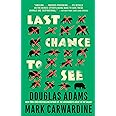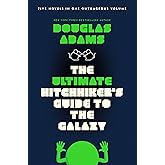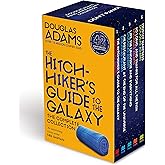Buy new:
-34% $11.89$11.89
FREE delivery January 14 - 15
Ships from: Orion LLC Sold by: Orion LLC
Save with Used - Acceptable
$7.21$7.21
Ships from: Amazon Sold by: Shakespeare Book House

Download the free Kindle app and start reading Kindle books instantly on your smartphone, tablet, or computer - no Kindle device required.
Read instantly on your browser with Kindle for Web.
Using your mobile phone camera - scan the code below and download the Kindle app.

Follow the authors
OK
Last Chance to See Paperback – October 13, 1992
Purchase options and add-ons
THE WASHINGTON POST BOOK WORLD
Join bestselling author Douglas Adams and zooligist Mark Carwardine as they take off around the world in search of exotic, endangered creatures. Hilarious and poignant--as only Douglas Adams can be--LAST CHANCE TO SEE is an entertaining and arresting odyssey through the Earth's magnificent wildlife galaxy.
- Print length256 pages
- LanguageEnglish
- PublisherBallantine Books
- Publication dateOctober 13, 1992
- Dimensions5.14 x 0.61 x 7.93 inches
- ISBN-100345371984
- ISBN-13978-0345371980
Book recommendations, author interviews, editors' picks, and more. Read it now.
Frequently bought together

Customers who viewed this item also viewed
Editorial Reviews
Review
“These authors don’t hesitate to present the alarming facts: More than 1,000 species of animals (and plants) become extinct every year. . . . Perhaps Adams and Carwardine, with their witty science, will help prevent such misadventures in the future.”—Boston Sunday Herald
“Very funny and moving . . . The glimpses of rare fauna seem to have enlarged [Adams’s] thinking, enlivened his world; and so might the animals do for us all, if we were to help them live.”—The Washington Post Book World
“[Adams] invites us to enter into a conspiracy of laughter and caring.”—Los Angeles Times
“Amusing . . . thought-provoking . . . Its details on the heroic efforts being made to save these animals are inspirational.”—The New York Times Book Review
From the Back Cover
THE WASHINGTON POST BOOK WORLD
Join bestselling author Douglas Adams and zooligist Mark Carwardine as they take off around the world in search of exotic, endangered creatures. Hilarious and poignant--as only Douglas Adams can be--LAST CHANCE TO SEE is an entertaining and arresting odyssey through the Earth's magnificent wildlife galaxy.
About the Author
Mark Carwardine is a zoologist, an outspoken conservationist, an award-winning writer, a BBC radio and TV presenter, a widely published wildlife photographer, a bestselling author, a wildlife tour operator and leader, a lecturer, and a magazine columnist. He co-presented the popular BBC TV series Last Chance to See with actor and comedian Stephen Fry, in which the unlikely duo followed in the footsteps of Carwardine’s original travels with Douglas Adams. Carwardine has written more than fifty books, including Field Guide to Whales, Dolphins and Porpoises; Mark Carwardine’s Guide to Whale Watching in North America; Mark Carwardine’s Guide to Whale Watching in Britain and Europe; Extreme Nature; The Guinness Book of Animal Records; Mark Carwardine’s Ultimate Wildlife Experiences; The Shark-Watcher’s Handbook; and On the Trail of the Whale.
Excerpt. © Reprinted by permission. All rights reserved.
TECHNOLOGY
THIS ISN’T AT ALL WHAT I expected. In 1985, by some sort of journalistic accident, I was sent to Madagascar with Mark Carwardine to look for an almost extinct form of lemur called the aye-aye. None of the three of us had met before. I had never met Mark, Mark had never met me, and no one, apparently, had seen an aye-aye in years.
This was the idea of the Observer Colour Magazine, to throw us all in at the deep end. Mark is an extremely experienced and knowledgeable zoologist who was working at that time for the World Wildlife Fund, and his role, essentially, was to be the one who knew what he was talking about. My role, and one for which I was entirely qualified, was to be an extremely ignorant non-zoologist to whom everything that happened would come as a complete surprise. All the aye-aye had to do was do what aye-ayes have been doing for millions of years; sit in a tree and hide.
The aye-aye is a nocturnal lemur. It is a very strange-looking creature that seems to have been assembled from bits of other animals. It looks a little like a large cat with a bat’s ears, a beaver’s teeth, a tail like a large ostrich feather, a middle finger like a long dead twig, and enormous eyes that seem to peer past you into a totally different world which exists just over your left shoulder.
Like virtually everything that lives on Madagascar, it does not exist anywhere else on earth. Its origins date back to a period in earth’s history when Madagascar was still part of mainland Africa (which itself had been part of the gigantic supercontinent of Gondwanaland), at which time the ancestors of the Madagascan lemurs were the dominant primate in all the world. When Madagascar sheered off into the Indian Ocean, it became entirely isolated from all the evolutionary changes that took place in the rest of the world. It is a life raft from a different time. It is now almost like a tiny, fragile, separate planet.
The major evolutionary change that passed Madagascar by was the arrival of the monkeys. These were descended from the same ancestors as the lemurs, but they had bigger brains, and were aggressive competitors for the same habitat. Where the lemurs had been content to hang around in trees having a good time, the monkeys were ambitious, and interested in all sorts of things, especially twigs, with which they found they could do all kinds of things that they couldn’t do by themselves—dig for things, probe things, hit things. The monkeys took over the world and the lemur branch of the primate family died out everywhere—other than on Madagascar, which for millions of years the monkeys never reached.
Then fifteen hundred years ago, the monkeys finally arrived, or at least the monkeys’ descendants—us. Thanks to astounding advances in twig technology, we arrived in canoes, then boats, and finally airplanes, and once again started to compete for use of the same habitat, only this time with fire and machetes and domesticated animals, with asphalt and concrete. The lemurs are once again fighting for survival.
My airplane full of monkey descendants arrived at Antananarivo airport. Mark, who had gone out ahead to make the arrangements for the expedition, met me for the first time there and explained the setup.
“Everything’s gone wrong,” he said.
He was tall, dark, and laconic and had a slight nervous tic. He explained that he used to be just tall, dark, and laconic, but that the events of the last few days had rather got to him. At least he tried to explain this. He had lost his voice, he croaked, due to a lot of recent shouting.
“I nearly telexed you not to come,” he said. “The whole thing’s a nightmare. I’ve been here for five days and I’m still waiting for something to go right. The Ambassador in Brussels promised me that the Ministry of Agriculture would be able to provide us with two Land Rovers and a helicopter. Turns out all they’ve got is a moped and it doesn’t work.
“The Ambassador in Brussels also assured me that we could drive right to the north, but the road suddenly turns out to be impassable because it’s being rebuilt by the Chinese, only we’re not supposed to know that. And exactly what is meant by ‘suddenly’ I don’t know because they’ve apparently been at it for ten years.
“Anyway, I think I’ve managed to sort something out, but we have to hurry,” he added. “The plane to the jungle leaves in two hours and we have to be on it. We’ve just got time to dump your surplus baggage at the hotel if we’re quick. Er, some of it is surplus, isn’t it?” He looked anxiously at the pile of bags that I was lugging, and then with increasing alarm at the cases of Nikon camera bodies, lenses, and tripods that our photographer, Alain le Garsmeur, who had been with me on the plane, was busy loading into the minibus.
“Oh, that reminds me,” Mark said, “I’ve just found out that we probably won’t be allowed to take any film out of the country.”
I climbed rather numbly into the minibus. After thirteen hours on the plane from Paris, I was tired and disoriented and had been looking forward to a shower, a shave, a good night’s sleep, and then maybe a gentle morning trying gradually to find Madagascar on the map over a pot of tea. I tried to pull myself together and get a grip. I suddenly had not the faintest idea what I, a writer of humorous science-fiction adventures, was doing here. I sat blinking in the glare of the tropical sun and wondered what on earth Mark was expecting of me. He was hurrying around, tipping one porter, patiently explaining to another porter that he hadn’t actually carried any of our bags, conducting profound negotiations with the driver, and gradually pulling some sort of order out of the chaos.
Madagascar, I thought. Aye-aye, I thought. A nearly extinct lemur. Heading out to the jungle in two hours’ time. I desperately needed to sound bright and intelligent.
“Er, do you think we’re actually going to get to see this animal?” I asked Mark as he climbed in and slammed the door. He grinned at me.
“Well, the Ambassador in Brussels said we haven’t got a hope in hell,” he said, “so we may just be in with a chance. Welcome,” he added as we started the slow pothole slalom into town, “to Madagascar.”
Antananarivo is pronounced Tananarive, and for much of this century has been spelt that way as well. When the French took over Madagascar at the end of the last century (“colonised” is probably too kind a word for moving in on a country that was doing perfectly well for itself but which the French simply took a fancy to), they were impatient with the curious Malagasy habit of not bothering to pronounce the first and last syllables of place names. They decided, in their rational Gallic way, that if that was how the names were pronounced then they could damn well be spelt that way too. It would be rather as if someone had taken over England and told us that from now on we would be spelling Leicester “Lester” and liking it. We might be forced to spell it that way, but we wouldn’t like it, and neither did the Malagasy. As soon as they managed to divest themselves of French rule, in 1960, they promptly reinstated all the old spellings and just kept the cooking and the bureaucracy. One of the more peculiar things that has happened to me is that as a result of an idea I had as a penniless hitchhiker sleeping in fields and telephone boxes, publishers now send me around the world on expensive author tours and put me up in the sort of hotel room where you have to open several doors before you find the bed. In fact, I was arriving in Antananarivo directly from a U.S. author tour which was exactly like that, and so my first reaction to finding myself sleeping on concrete floors in spider-infested huts in the middle of the jungle was, oddly enough, one of fantastic relief. Weeks of mind-numbing American Expressness dropped away like mud in the shower and I was able to lie back and enjoy being wonderfully, serenely, hideously uncomfortable. I could tell that Mark didn’t realise this and was at first rather anxious showing me to my patch of floor—“Er, will this be all right? I was told there would be mattresses.… Um, can we fluff up the concrete a little for you?”—and I had to keep on saying, “You don’t understand. This is great, this is wonderful, I’ve been looking forward to this for weeks.”
Product details
- Publisher : Ballantine Books; Reprint edition (October 13, 1992)
- Language : English
- Paperback : 256 pages
- ISBN-10 : 0345371984
- ISBN-13 : 978-0345371980
- Item Weight : 7.2 ounces
- Dimensions : 5.14 x 0.61 x 7.93 inches
- Best Sellers Rank: #177,537 in Books (See Top 100 in Books)
- #29 in Science & Scientists Humor
- #243 in Ecology (Books)
- #1,363 in Sociology Reference
- Customer Reviews:
About the authors

Douglas Adams (1952-2001) was the much-loved author of the Hitchhiker's Guides, all of which have sold more than 15 million copies worldwide.
Photo by michael hughes from berlin, germany (douglas adams Uploaded by Diaa_abdelmoneim) [CC BY-SA 2.0 (http://creativecommons.org/licenses/by-sa/2.0)], via Wikimedia Commons.

Discover more of the author’s books, see similar authors, read book recommendations and more.
Customer reviews
Customer Reviews, including Product Star Ratings help customers to learn more about the product and decide whether it is the right product for them.
To calculate the overall star rating and percentage breakdown by star, we don’t use a simple average. Instead, our system considers things like how recent a review is and if the reviewer bought the item on Amazon. It also analyzed reviews to verify trustworthiness.
Learn more how customers reviews work on AmazonCustomers say
Customers find the book entertaining and humorous with its wit and charm. They appreciate the informative content and meaningful descriptions of endangered creatures. The writing style is described as fantastic, smooth, and lucid enough for everyone to read. Customers describe the story as engaging and fascinating. They find the book heartwarming yet poignant at times, and praise the author's work as brilliant.
AI-generated from the text of customer reviews
Customers find the book entertaining and engaging. They appreciate the author's wit and charm, as well as the weird animal names. The book can make readers laugh or cry at different moments, with its serious undertone and message.
"...That's what makes it such a powerful book, and one everyone should read...." Read more
"...He made a witty, true, and interesting parallel between vulgar tee-wearing tourists (who happened to be from a non-uk country) convergently..." Read more
"...30 some years later. It's still an amazing read and I love Douglas Adams style...." Read more
"...the value is worth it." Read more
Customers find the book insightful and humorous. It imparts serious conservation information in a fun, fascinating way. Readers say it makes them empathize with the animals discussed and appreciate the fragility and beauty of endangered species and ecosystems.
"...But at the same time, Adams's courage, compassion, humility, and humor make a compelling case for humanity's continued existence as a species." Read more
"...He made a witty, true, and interesting parallel between vulgar tee-wearing tourists (who happened to be from a non-uk country) convergently..." Read more
"...Easy read. Super interesting. Highly recommended" Read more
"...on the situations they encounter, combined with his brilliant, insightful, and frequently hilarious narratives that make this book special...." Read more
Customers appreciate the writing quality of the book. They find it well-written with Douglas Adams' natural wit and charm. The descriptions are smooth and lucid enough for everyone to read. It reads like a Hitchhiker's or Dirk Gentley book, but on a different subject.
"...The beauty is that it's also smooth and lucid enough that everyone can read it...." Read more
"...Easy read. Super interesting. Highly recommended" Read more
"...This intonation adds emphasis and accent where words are too subtle. His real fear comes through better with his spoken words...." Read more
"...I keep giving them away. It is fantastically written with Douglas Adams' natural wit and charm, but it manages to convey the seriousness..." Read more
Customers find the book's story engaging and funny. It provides a great introduction to the dramatic and irreversible damage our growth has caused. The true stories are told in a lively and fascinating manner. The seriousness of the subject is eased into readers' perception while still providing plenty of humor. The first chapters are worth reading, though some chapters are not so good. Overall, customers find the book inspiring and a cautionary tale about what we are losing on our planet.
"...Adams' natural wit and charm, but it manages to convey the seriousness of the subject very well...." Read more
"...: the material and what it covers - extinction - is of an extremely serious nature, yet the reader can't help but chuckle at some of the ways in..." Read more
"This is a beautiful, poignant, hilarious nature narrative...." Read more
"...a very important ecological conservation message, but the amusing true stories of trying to get from one place to another on questionable vessels..." Read more
Customers find the book humorous and poignant at the same time. They say it brings humor to a somber topic, bringing them to tears at times. The book is described as bittersweet, bringing humor to a sober topic with a humorous slant.
"...Clever and sad--worth reading and suggesting to others." Read more
"This is a beautiful, poignant, hilarious nature narrative...." Read more
"...make you burst with laughter in one page, and in the next one bring you to tears." Read more
"...beginning I thought the book was somewhat amusing, however making fun of missionaries, making derogatory statements about people of faith because it..." Read more
Customers appreciate the author's writing style. They find the book brilliant and witty, great for fiction readers. The book reveals Adams' character and interests in a profound way.
"...But at the same time, Adams's courage, compassion, humility, and humor make a compelling case for humanity's continued existence as a species." Read more
"...I never knew Adams personally, but love the man and his work (possibly as much as Dawkins seemed to, whom wrote a lament for Douglas)...." Read more
"...30 some years later. It's still an amazing read and I love Douglas Adams style...." Read more
"...But when it comes to travel-oriented nonfiction, Adams is absolutely the best...." Read more
Customers find the book relevant and eye-opening 30 years later. They describe it as a classic travelogue, memoir, and layperson's guide. The book is humorous and meaningful, with a clever approach.
"This is a fantastic read: part travelogue, part memoir, part lay-persons guide to conservation and biology...." Read more
"...This book is still relevant, but not as eye-opening as it was then. Still a good read that I recommend highly." Read more
"The book is a classic, for people who like Douglas Adam's style humour (who doesn't??) and conservation-minded folks alike...." Read more
"...A funny, and meaningful, book." Read more
Customers enjoy the book's touching and loving portrayal of animals. They find it easy to read, charming, and magical.
"...Clearly. But none of it sings like Last Chance to See. This book is a passionate, loving, critical look at the human species and the influence we've..." Read more
"...It is fantastically written with Douglas Adams' natural wit and charm, but it manages to convey the seriousness of the subject very well...." Read more
"...While she enjoyed his other books, she really found this one endearing and I think she finished it in two days since she couldn't put it down." Read more
"Not only is this a funny, touching, clever book, it is a vitally important book to read...." Read more
Top reviews from the United States
There was a problem filtering reviews right now. Please try again later.
- Reviewed in the United States on September 26, 2022I love Douglas Adams's science fiction. Just look at my bookshelves. So it's as a firm fan that I say: Douglas Adams was wasted--wasted--on science fiction.
The man is obviously a science writer.
His science fiction was always good. Clearly. But none of it sings like Last Chance to See. This book is a passionate, loving, critical look at the human species and the influence we've had on our planet-mates. It chronicles the decline, and impending loss, of some wonderful, charismatic vertebrates. It takes us to task for the degradation of the planet, and makes us feel the tragic loss of our heritage, but it never depresses. It bounces up from the darkest moments with Adams's trademark dark humor. Of course, that humor has the effect of throwing all the rest into sharp relief, highlighting the tragedy and wounding your heart. That's what makes it such a powerful book, and one everyone should read.
The beauty is that it's also smooth and lucid enough that everyone can read it. He never preaches, and the book always keeps the tone of a story told around a campfire, among friends.
If this doesn't inspire anyone who reads it to care just a little bit more about the non-human, but still precious, species that inhabit Earth, then I will give up trying to save them tomorrow. But at the same time, Adams's courage, compassion, humility, and humor make a compelling case for humanity's continued existence as a species.
- Reviewed in the United States on March 31, 2012
5.0 out of 5 stars One of Greatest Sci-Fi Authors Ever....In the Jungle Writing Non-fiction! Superb!
Have been rereading portions of the late atheist novelist Douglas Adams' Last Chance to See.
What a marvelous, hilarious, evolutionarily witty and brilliant piece of non-fiction this is. Allow me to briefly surmise some of the spectacular facets of this delightful book.
Well, screw that, here's what the book is...
Take the creator of Vorgons, Zaphod Beeblebrox, The HitchHiker's Guide to the Galaxy, (and that 5 book series) and put him in the real-life context of:
* tourists wearing vulgar tourists in exotic places
* sniveling and unhelpful airplane customer service people
* endangered animals
* commuting on a rickety boat with a three-day-old dead goat
* some of the most venomous snakes and creatures to exist
* and more
I love how Douglas (in studying evolution in this book a bit) dissects everything. There was one passage where he deconstructs the composition of the paper pages and leather binding of a notebook (I would've used computer personally lol) (bollocks I will find it and quote it exactly but can't open kindle at moment):
He does things and has descriptions like that throughout the book. He made a witty, true, and interesting parallel between vulgar tee-wearing tourists (who happened to be from a non-uk country) convergently evolving in a way that was similar to brits that he knew.
I never knew Adams personally, but love the man and his work (possibly as much as Dawkins seemed to, whom wrote a lament for Douglas). He's easily one of, or The, fave sci-fi authors, but that said, this non-fiction of his is even better. Hilarious and wise simul.
Put one of the world's most amusing fiction sci-fi authors in with the ants and dirt and forests embarking to see some of the rarest animals on the planet. It's marvelous, insightful atheism, didactic evolutionary biology, promisingly british, freakishly funny, and just awesome.
- Reviewed in the United States on February 23, 2023I read this book when it first came out and forgot how much it influenced me. 30 some years later. It's still an amazing read and I love Douglas Adams style. First thing tomorrow I want to check on the population numbers of the various things mentioned in the book. Easy read. Super interesting. Highly recommended
- Reviewed in the United States on September 21, 2009This is my 3rd e-book purchase of this old (almost 19 years) media as well as reading the paper version of this book. I left one with the Infomedia project at Carnegie-Mellon Univ. and my 2nd copy is somewhere loaned out. It requires the Classic Mac environment (OS 9 or earlier with color) and Hypercard with the memory cracked up. I met and discussed this work with Adam just before he died, and he was very proud of it.
The text is slightly abridged from the original book. I know 1-2 areas which I liked left out. Adams read the entire book aloud and this is recorded. If you like the English sound of Adams' this is an additional incentive to listen as well as read this book with your eyes. This intonation adds emphasis and accent where words are too subtle. His real fear comes through better with his spoken words.
His co-author Mark did (wrote and spoke) the equivalent to side bars with more biological information on the individual endangered species. Where the paper version of the book about 24 color plates, this Voyager edition had over 800 photos with captions (hence 2 CDs). Bob Stein who ran Voyager and showed me around their new offices in New York after their move from Santa Monica pulled out all the stops on this expanded book. Originally priced at $50 (paper hardbound was about $20-30 and softbound for about $10), the value is worth it.
- Reviewed in the United States on December 19, 2021Last Chance to See by Douglas Adams is a funny and moving trek across the world to see certain species before they go extinct. If it weren't for his incredible humor, I probably would have been a sobbing puddle of tears before I finished the first chapter. It's not easy to read about the damage humanity has wrought around the world. It is heartening to know there are people out there that care enough to dedicate their lives to protecting those that can't protect themselves. While traipsing around to gather material to tell these important stories, Adams manages to get himself into all sorts of predicaments, some which may be familiar to those who've also traveled to exotic locales. The only thing I wish my Kindle version had was photos of the animals and the travels. If you like stories of travel or animals, this is a great read.
Top reviews from other countries
-
 Longhua JinReviewed in Germany on December 16, 2024
Longhua JinReviewed in Germany on December 16, 20245.0 out of 5 stars last chance to see
Douglas Adams nimmt uns mit auf eine charmant-chaotische Reise zu den letzten ihrer Art – vom Kakapo bis zum Yangtse-Delfin. Mit seinem typischen Humor beschreibt er die skurrilen Momente, die Natur und Mensch so einzigartig machen, ohne dabei den ernsten Ton des Artenschutzes zu verlieren.
Dieses Buch ist nicht nur unterhaltsam, sondern auch ein Weckruf: Die Welt ist voller Wunder, aber wir müssen sie besser schützen. Leicht zu lesen, schwer zu vergessen – perfekt für Fans von kluger Umweltliteratur und schrägem Witz.
 tom rottinghuisReviewed in the United Kingdom on July 2, 2024
tom rottinghuisReviewed in the United Kingdom on July 2, 20245.0 out of 5 stars Very clever and witty
An easy yet educational read, made me laugh out loud and at the same time it made me sad about all the invaluable species that have gone the way of the dodo; interesting animals, Douglas Adams... The world is a less special place without them!
-
 GiuliaReviewed in Italy on December 11, 2022
GiuliaReviewed in Italy on December 11, 20225.0 out of 5 stars Libro bellissimo.
Lo stile di Douglas Adams ma in un libro che invece di parlare di mondi lontani parla proprio del nostro. Uno spettacolo.
 9CowsReviewed in India on June 12, 2018
9CowsReviewed in India on June 12, 20185.0 out of 5 stars Easy yet potent.
What can I say? Well if you know Douglas Adams' work and are picking this up for his writing style, you have made a good choice. If you don't know about him, but want to inform yourself a little about our impact on our fellow earth species and incredible efforts of a handful to reverse that impact, you have made a good choice.
I never knew, such an important and potent topic can be written in such an easy style. You pretty much laugh your way through the book, but miraculously, you are very much made aware of the reason why this book was written. You do appreciate the comical style, but you are left pondering over the irreversible damage we have made and deeply.
Read it, you will remember it forever.
 Mark WoodReviewed in Japan on March 21, 2023
Mark WoodReviewed in Japan on March 21, 20235.0 out of 5 stars Adams being serious, funny, and Brilliant
A great read from Douglas Adams. He travels the world looking for endangered animals and writes seriously but with humor about the experience. Beautiful and sad












